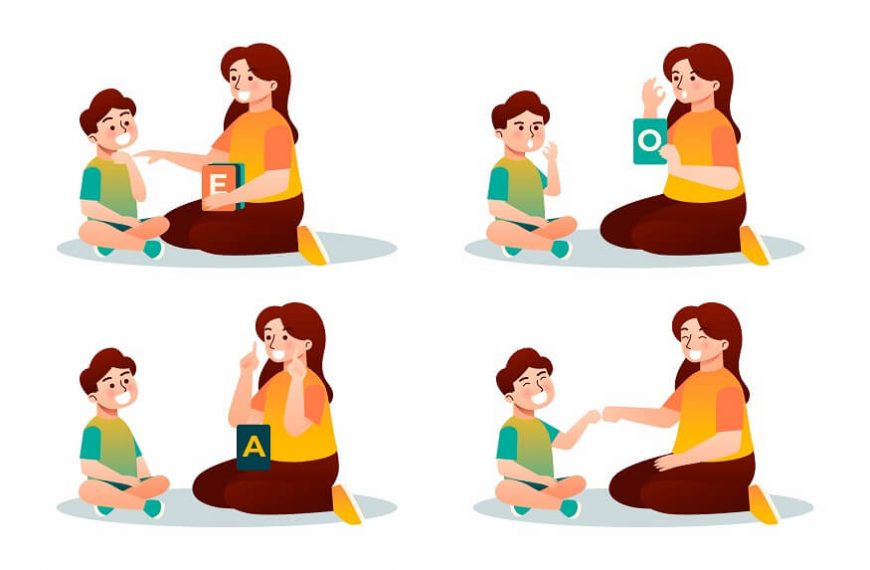While it is true that language skills develop over time, a strong foundation from childhood is essential for such development to take place effectively. As we know, toddlers first go through the babbling stage where they usually utter incoherent sounds that they attach meaning to. As adults, we find it cute when toddlers utter such unidentifiable words or make sounds to show meaning. While it is cute, it should not be consistently encouraged as it could hamper the language skills of your little ones in the future. If the thought of how to teach kids to speak has been troubling you, you’ve come to the right place.
As caregivers, we always want to give our children the best. In the world we live in, good communication skills are essential to get things done effectively and efficiently. If you’re a new parent or if this is your first child, questions regarding cognitive development and the development of language skills will most definitely cross your mind. If they do, know that you’re not alone. It is common for any caregiver to think in this manner. Luckily for you, we’ve come up with a few tried and tested techniques which will work wonders in developing the language skills of your toddler.
- Reading- While you don’t expect your toddler to be a genius and start reading all by himself or herself, you can read a short story to your toddler before bed. This is a relatively simple way of increasing your child’s vocabulary and at the same time familiarising him or her with sounds associated with words. Believe it or not but from a young age of just two years, kids can slowly retain pieces of the story which you read to them. Apart from encouraging toddler communication, it will also be an activity during which your young one picks up different ideas. If a short story is too heavy for your toddler, perhaps a lullaby or a nursery rhyme would be more suitable.
- Talk to your child- The importance of communication between parents and children is manifold. Apart from building a stronger bond, talking to your little ones daily will help them quickly pick up the language. While speaking to them, remember to use simple words and short sentences. Some children start speaking later than others and if this is your child, know that there’s nothing wrong with it. Even if your child speaks using hand gestures, continue to speak to your child in the language you speak at home. Knowing how to teach children to speak is an art that is developed over time and one that is perfected with practice.
- Avoid baby talk- As cute as it may sound, responding to your child in the same babbling language that they speak as toddlers hampers the development of language and communication skills. Using grammatically correct words when your child is referring to an object in baby language can help your child slowly pick up on the phonetics associated with those words.
- Present them with choices- It is the instinct of every parent to make choices for their children no matter how young or old they are. However, breaking out of this habit and allowing your little ones to choose small things that don’t have much importance can yield massive gains in terms of communication skills. One of the best ways to make a child speak is by presenting them with choices. It not only enhances their communication skills but also develops their critical thinking skills. One of the simplest ways of putting this into practice is by providing your child with different healthy breakfast options and having him or her choose.
- Reduce screen time- A few decades ago, this wasn’t even a cause for concern. However, in today’s world with kids having access to smart televisions, smartphones and tablets, it is important to limit screen time. While too much screen time leads to deteriorating eyesight, it also results in language delays. This is because overwatching cartoons leads children to only process what is going on on-screen and not think independently. It clutters up the mind and doesn’t give them the space to imagine. Instead of allowing your child to glue their eyes to such devices, you should interact with them more. This is one of the best activities to improve communication skills for toddlers.
What To Do If Your Toddler Still Isn’t Talking?
If your little ones are still not showing any signs of speaking even after trying out the above-mentioned techniques, it’s time for you to look for symptoms of speech and language delay. Some of the symptoms include not speaking at the age of two years, having a very limited vocabulary, finding it difficult to piece together phrases, or having trouble understanding simple requests.
If you do identify any of these signs and symptoms in your little ones, then it is time for you to seek professional help. You can consult a paediatrician who could give you the medical advice you so dearly seek. Some of the speech delays that occur due to medical reasons include autism, intellectual disabilities or even hearing impairments. The one thing you shouldn’t do is panic. Many children are dealing with these issues and have normal, healthy and fulfilling lives.
At EuroKids, we try our best to involve your little ones in activities that enhance speech and communication. These activities are designed by professionals who work towards giving your children the best experience in preschool. Our long-term goals focus on the best activities to improve communication skills for toddlers. Toddler speech development is an aspect that needs to be stressed upon and here at EuroKids, we do precisely that. If you want your toddler’s speech development to escalate, visit us at the centre closest to you.
















